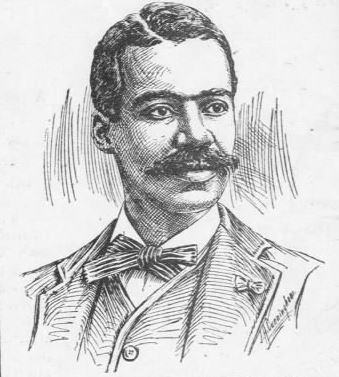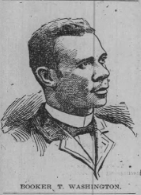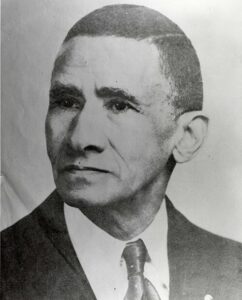Once upon a time in Black Entrepreneur History lived an African American man named Robert Pelham Jr. who was an editor, journalist, civil rights activist, speaker and founder of a newspaper called The Detroit Plaindealer and advocate on why African Americans, at that time, should abandon the Republican party. He was also the inventor of a tabulation machine.
Birth and Childhood
Robert Pelham Jr. was born in the city of Petersburg, Virginia to parents Robert and Frances Pelham on January 4, 1859. He grew up the middle of seven children. While he was a baby, his entire family moved to Detroit, Michigan where his father worked as a plasterer, or someone who plasters walls and ceilings, and his mother a house keeper. As far as Robert, when he turned of age, he attended a school for African American children[1].
He completed high school and also studied law at Howard University later in his life, gaining a law degree in 1904.
By the time Robert was 21, he was already working in a printing house but still living with his parents and siblings on 210 Congress Street East in Detroit.[2].

Journalistic, Political and Civil Rights Career
In 1883, Robert Pelham Jr. founded newspaper Detroit Plaindealer which published nationwide African American interests for Black people in the state of Michigan. Distribution of the newspaper were in hotels and in the streets.
Detroit Plaindealer became a very prominent paper and very successful, located on the second floor of a building at 145 Jefferson Avenue in Room 8. It became one of the best known African American founded and edited newspapers in the nation. They had full ads in paper for hiring compositors, and other major papers from around the nation sourced it for factual information.
The Detroit Plaindealer shut down after ten years of publications, but left a legacy of fighting for African American inclusion in many areas of prominence in America, being a part of a liberal, progressive movement. It was the Detroit Plaindealer that led the movement (1888) for Black people to be in the major league lineups for Baseball, for which many Black men qualified but were excluded due to their race. Though no longer functioning, the Plaindealer released a statement:
“Since Afro-Americans can and do play a stiff game, and hundreds of their race give substantial support to the National League, this, it seems to us, would be but fair and right [to include Black players in the league].”
The Pittsburgh Courier (Pittsburgh, Pennsylvania) 24 Jan 1953, Sat Page 14
His Growing Distrust and Dislike of the Republican Party
He was also affiliated with the Republican party and on the Republican committee, later pointing to the many reasons why Black people needed to leave that party altogether.
As reported in the Detroit Free Press of 1882, he would go on to criminally question the Republican party on why there was no “colored police, lamp lighters or school teachers appointed[to the Republican committee]? There are just as capable colored men and women in the city for these positions as whites, and colored men help to support the local government.” [3]
He also thought, in summary, that “colored men should no longer consider themselves slaves to the Republican party. What the party did for the race they could not have done otherwise and did it in self defense. Colored troops went to battle in defense of the union, and the race has stood loyally and obediently to the party. The party has been thanked and repaid, but apparently doesn’t appreciate the colored votes any longer. The time for independent action has arrived.“[3]
“He illustrated how anxious Republicans were on election day to have every colored voter brought out, and even carriages were sent for them, but after they had voted the Republican ticket, and the carriages were out of sight, nothing more was thought of the race.” [3]
In the end, Robert Pelham Jr. no longer wanted to be a part of the Republican party who wanted the Black votes, but didn’t want Black people on the committee and holding office. Not only did Pelham Jr. feel that way, but many other Black politicians at that time. All of them began to see how the Republican Party wanted to keep the honor only with white people but wanted Black people to take it to success while leaving them, the Black people, at the bottom.
Research Efforts for the Improvement of African American Welfare
In 1901, Robert Pelham had also proven himself a valuable asset again to the African American community by researching and distributing, statistical, scientific information on Land Owning by Negroes in Western States, proving the progress of African Americans along the lines of real estate and property ownership. His scholarly research was used as the foundation at conferences with other prominent and powerful Black civil rights leaders such as African American business man and inventor Andrew W. Hilyer and others[4].
Pelham was a member of Attucks Rifles, a military organization of African American men, and he served on the board of directors.[5]
Census Tabulator for United States Census & Inventor
Along with politics and civil rights, Robert Pelham Jr. worked for the United States Census Bureau at Washington D.C., and he was recorded and noted as breaking record speeds for Michigan with little error by tabulating 1150 schedules in one day which was twice the average tabulation. 950 of the schedules of that 1150 were done in only 4 hours. Though he did it with much speed, there was no sacrifice to accuracy and quality.
Later, someone tried to beat Robert Pelham’s record, however, though the person tabulated more census schedules, their work was of less quality and severely inaccurate, thus failing. Pelham attributed his success at the census to his early work with a Detroit paper.[6] This paper was more than likely the first job he had at a Detroit paper at the age of 21.
Robert Pelham also invented a “tabulating machine which displaced a dozen men and performed their tasks with faultless precision.” He prospered well from the invention.[7].
At the age of 81 in 1940, he was still in Washington D.C. working as the editor and publisher of another paper – the Washington Tribune[8].
Marriage
On April 5, 1893, Robert Pelham Jr. married a woman named Gabrielle Redmond [Pelham] in Adrian, Michigan at the age of 34[9].
They lived on 153 Tea Street in Washington D.C in 1920 when he was 61 years of age, and his two adult daughters, G. Dorothy and Sarah L., along with his mother n law, Sarah L. Lattimore, lived with them[10]. The couple also had a son named Robert B. Pelham.
Death
Robert Pelham Jr. passed away on June 12, 1943.
Source
- [1]Year: 1870; Census Place: Detroit Ward 4, Wayne, Michigan; Roll: M593_712; Page: 150A; Family History Library Film: 552211
- [2]Year: 1880; Census Place: Detroit, Wayne, Michigan; Roll: 611; Page: 73D; Enumeration District: 274
- [3]Detroit Free Press (Detroit, Michigan) 05 Sep 1882, Tue Page 6
- [4]The Colored American (Washington, District of Columbia) 04 May 1901, Sat Page 2
- [5]The Indianapolis Leader (Indianapolis, Indiana)25 Dec 1880, Sat Page 2
- [6]The Washington Times (Washington, District of Columbia) 13 Mar 1902, Thu Page 4
- [7]The Pittsburgh Courier (Pittsburgh, Pennsylvania) 17 Feb 1940, Sat Page 6
- [8]The New York Age (New York, New York) 03 Feb 1940, Sat Page 6
- [9]Michigan Department of Community Health, Division of Vital Records and Health Statistics; Lansing, MI, USA; Michigan, Marriage Records, 1867-1952; Film: 49; Film Description: 1893 Gratiot-1893 Muskegon
- [10]Year: 1920; Census Place: Washington, Washington, District of Columbia; Roll: T625_211; Page: 9A; Enumeration District: 210
- Year: 1940; Census Place: Washington, District of Columbia, District of Columbia; Roll: m-t0627-00570; Page: 5A; Enumeration District: 1-509






More Related Stories
Isaac Scott Hathaway – Founder of Isaac Hathaway Art Company & Designer of First African American Coin
James Wormley – Founder of the Most Expensive Hotel in Washington D.C. in 1800s – the Wormley Hotel
William E. Matthews – Wealthy Financial Broker & Civil Rights Leader of 1800s